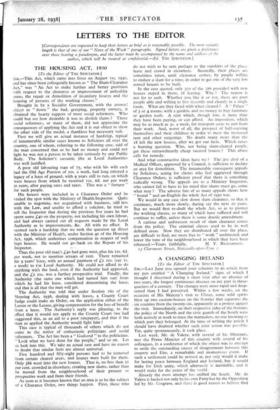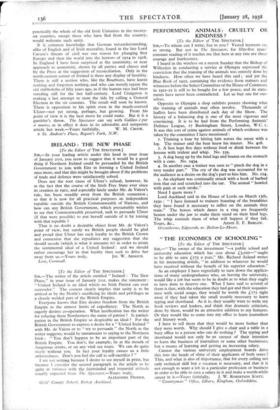A CHANGING IRELAND
[TO the Editor of THE SPECTATOR.] SIR,—Last June you opened your columns to an article from my pen entitled " A Changing Ireland," signs of which I thought I discerned during a short visit after an absence of two years, the longest continuous absence on my part in three- quarters of a century. The changes were more rapid and deep- seated than I had perceived. Within a few weeks, on the occasion of His Majesty's visit to Ulster, some wild spirits blew up two custom-houses on the frontier that separates the . six counties from the twenty-six, apparently as a protest against the visit. Immediately, on their respective sides of the frontier, the police of the North and the civic guards of the South were both actively at work to trace the marauders, no one knowing to which part they belonged. At the time of writing the article I should have doubted whether such joint action was possible. Yet, quite spontaneously, it took place.
Last week, Mr. de Valera, with several of his Ministers, met the Prime Minister of this country with several of his colleagues, in a conference of which the object was to attempt to settle the outstanding causes of disagreement between this country and Eire, a remarkable and momentous event. If such a settlement could be arrived at, not only would it make for lasting peace between England and Ireland, but it would make for Irish unity, which ultimately is inevitable, and it would make for the peace of the world.
Already the mere attempt has unified the South. Mr. de Valera is backed not only by his own Party but by the Opposition led by Mr. Cosgrave, and there is good reason to believe that practically the whole of the old Irish Unionists in the twenty- six counties, except those who have fled from the country, would welcome such unity.
It is common knowledge that German misunderstanding, alike of English and of Irish mentality, found in the late Lord Carson's threats of civil war one reason for plunging first Europe and then the world into the horrors of 1914 to 1918. In England I have been surprised at the unanimity, or near approach to unanimity, shown by all parties and classes and by the Press at the suggestion of reconciliation. Only in the north-eastern corner of Ireland is there any display of hostility. There is still a section who, like the Bourbons, have learnt nothing and forgotten nothing, and who can merely repeat the old shibboleths of fifty years ago, as if the human race had been standing still for the last half-century. Lord Craigavon is making a last attempt to stem the tide by calling a General Election in the six counties. The result will soon be known. There is opposition to his spirit even in the much-coerced Ulster—not yet strong, perhaps, but growing. From his point of view it is the best move he could make. But it is a gambler's throw. The Spectator can say with Galileo é pur si muove, as in effect it does in its admirable and temperate



















































 Previous page
Previous page